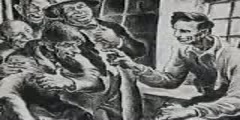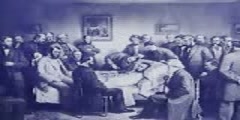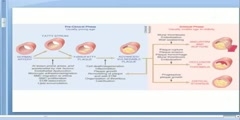Lec 12 - And the War Came
Lec 12 - And the War Came, 1861: The Sumter Crisis, Comparative Strategies The Civil War and Reconstruction (HIST 119) After finishing with his survey of the manner in which historians have explained the coming of the Civil War, Professor Blight focuses on Fort Sumter. After months of political maneuvering, the Civil War began when Confederates fired on Fort Sumter, in the harbor outside Charleston, SC. The declaration of hostilities prompted four more states--Virginia, Tennessee, North Carolina, and Arkansas--to secede. Professor Blight closes the lecture with a brief discussion of some of the forces that motivated Americans--North and South--to go to war. 00:00 - Chapter 1. Introduction: The Advent of War 05:06 - Chapter 2. A Meaningless War? Postwar Thoughts on the Civil War 12:15 - Chapter 3. April 1861: The Situation at Fort Sumter 24:28 - Chapter 4. Lincoln's Reaction and the Secession of the Upper South 37:01 - Chapter 5. Why Did I Go to War? Personal Motivations from the North and South 44:48 - Chapter 6. Conclusion Complete course materials are available at the Open Yale Courses website: http://open.yale.edu/courses This course was recorded in Spring 2008.
Video is embedded from external source so embedding is not available.
Video is embedded from external source so download is not available.
Channels: Others
Tags: Abraham Lincoln Brothers War Ft. Sumter irrepressible conflict Needless school William Seward
Uploaded by: yalecivilwar ( Send Message ) on 01-09-2012.
Duration: 46m 37s
Here is the next lecture for this course
Abraham Lincoln - The President Part-2
00:37 | 5039 viewsAbraham Lincoln Part 1
01:07 | 5390 viewsPresident Abraham Lincoln Part 3
00:51 | 4831 viewsLec 15 - Lincoln, Leadership, and Race: E ...
51:49 | 2475 viewsLiposuction - fat modeling with Dr. Will ...
05:28 | 20648 viewsX Ray Physics Documentary By William D Co ...
08:45 | 5161 viewsCrossing the stream by the Cheetah brothers
01:38 | 4165 viewsLec 10 - Genomic Conflict
47:51 | 3449 viewsLec 9 - A Pre-School Child's First Dental ...
28:16 | 2860 viewsLec 22 - Media and the Fertility Transiti ...
01:16:43 | 2953 viewsLec 8 - Nineteenth-Century Medicine: The ...
49:12 | 2796 viewsLec 2 - Appomattox Court House and Lincol ...
06:01 | 2522 viewsLec 7 - Edible Education: School Lunch
01:20:48 | 2170 viewsChapter 12b - medical school pathology
23:28 | 2107 viewsChapter 11a - medical school pathology
55:04 | 1959 viewsNo content is added to this lecture.
This video is a part of a lecture series from of Yale
Lecture list for this course
Lec 1 - Introductions: Why Does the Civil War Era Have a Hold on American Historical
Lec 2 - Southern Society: Slavery, King Cotton, and Antebellum America's
Lec 3 - A Southern World View: The Old South and Proslavery Ideology
Lec 4 - A Northern World View: Yankee Society, Antislavery Ideology and the Abolition Movement
Lec 5 - Telling a Free Story: Fugitive Slaves and the Underground Railroad in Myth and Reality
Lec 6 - Expansion and Slavery: Legacies of the Mexican War and the Compromise of 1850
Lec 7 - A Hell of a Storm The Kansas-Nebraska Act and the Birth of the Republican Party
Lec 8 - Dred Scott, Bleeding Kansas, and the Impending Crisis of the Union, 1855-58
Lec 9 - John Brown's Holy War: Terrorist or Heroic Revolutionary?
Lec 10 - The Election of 1860 and the Secession Crisis
Lec 11 - Slavery and State Rights, Economies and Ways of Life: What Caused the Civil War?
Lec 13 - Terrible Swift Sword: The Period of Confederate Ascendency, 1861-1862
Lec 14 - Never Call Retreat: Military and Political Turning Points in 1863
Lec 15 - Lincoln, Leadership, and Race: Emancipation as Policy
Lec 16 - Days of Jubilee: The Meanings of Emancipation and Total War
Lec 17 - Homefronts and Battlefronts:
Lec 19 - To Appomattox and Beyond: The End of the War and a Search for Meanings
Lec 20 - Wartime Reconstruction: Imagining the Aftermath and a Second American Republic
Lec 21 - Andrew Johnson and the Radicals: A Contest over the Meaning of Reconstruction
Lec 22 - Constitutional Crisis and Impeachment of a President
Lec 23 - Black Reconstruction in the South: The Freedpeople and the Economics of Land and Labor
Lec 24 - Retreat from Reconstruction: The Grant Era and Paths to
Lec 25 - The Civil War and Reconstruction Era
















